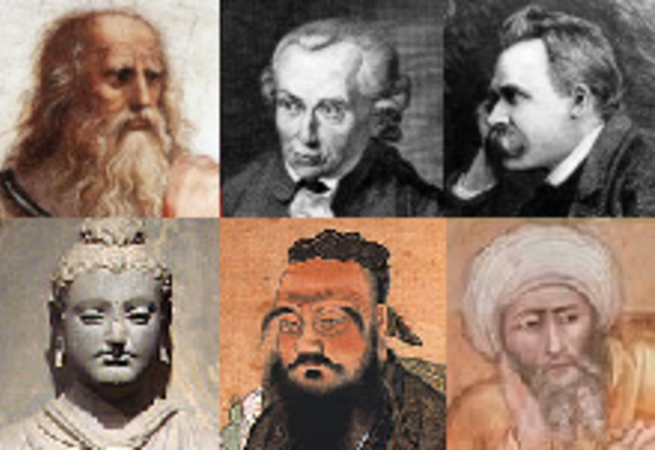-
Idealism
In philosophy, idealism is the group of metaphysical philosophies that assert that reality, or reality as humans can know it, is fundamentally mental, mentally constructed, or otherwise immaterial. Epistemologically, idealism manifests as a skepticism about the possibility of knowing any mind-independent thing. In contrast to materialism, idealism asserts the primacy of consciousness as the origin and prerequisite of material phenomena. According to this view, consciousness exists before and is the pre-condition of material existence. Consciousness creates and determines the material and not vice versa. Idealism believes consciousness and mind to be the origin of the material world and aims to explain the existing world according to these principles.
Idealism theories are mainly divided into two groups. Subjective idealism takes as its starting point the given fact of human consciousness seeing the existing world as a combination of sensation. Objective idealism posits the existence of an objective consciousness which exists before and, in some sense, independently of human ones. In a sociological sense, idealism emphasizes how human ideas—especially beliefs and values—shape society. As an ontological doctrine, idealism goes further, asserting that all entities are composed of mind or spirit. Idealism thus rejects those physicalist and dualist theories that fail to ascribe priority to the mind.
The earliest extant arguments that the world of experience is grounded in the mental derive from India and Greece. The Hindu idealists in India and the Greek neoplatonists gave panentheistic arguments for an all-pervading consciousness as the ground or true nature of reality. In contrast, the Yogācāra school, which arose within Mahayana Buddhism in India in the 4th century CE, based its “mind-only” idealism to a greater extent on phenomenological analyses of personal experience. This turn toward the subjective anticipated empiricists such as George Berkeley, who revived idealism in 18th-century Europe by employing skeptical arguments against materialism. Beginning with Immanuel Kant, German idealists such as Georg Wilhelm Friedrich Hegel, Johann Gottlieb Fichte, Friedrich Wilhelm Joseph Schelling, and Arthur Schopenhauer dominated 19th-century philosophy. This tradition, which emphasized the mental or “ideal” character of all phenomena, gave birth to idealistic and subjectivist schools ranging from British idealism to phenomenalism to existentialism.
Idealism as a philosophy came under heavy attack in the West at the turn of the 20th century. The most influential critics of both epistemological and ontological idealism were G. E. Moore and Bertrand Russell, but its critics also included the new realists. According to Stanford Encyclopedia of Philosophy, the attacks by Moore and Russell were so influential that even more than 100 years later “any acknowledgment of idealistic tendencies is viewed in the English-speaking world with reservation”. However, many aspects and paradigms of idealism did still have a large influence on subsequent philosophy.
-
Pragmatism
Pragmatism is a philosophical tradition that began in the United States around 1870. Its origins are often attributed to the philosophers Charles Sanders Peirce, William James, and John Dewey. Peirce later described it in his pragmatic maxim: “Consider the practical effects of the objects of your conception. Then, your conception of those effects is the whole of your conception of the object.”Pragmatism considers words and thought as tools and instruments for prediction, problem solving and action, and rejects the idea that the function of thought is to describe, represent, or mirror reality. Pragmatists contend that most philosophical topics—such as the nature of knowledge, language, concepts, meaning, belief, and science—are all best viewed in terms of their practical uses and successes. The philosophy of pragmatism “emphasizes the practical application of ideas by acting on them to actually test them in human experiences”. Pragmatism focuses on a “changing universe rather than an unchanging one as the idealists, realists and Thomists had claimed”.
-
Idealism (noun)
The property of a person of having high ideals that are usually unrealizable or at odds with practical life.
-
Idealism (noun)
The practice or habit of giving or attributing ideal form or character to things; treatment of things in art or literature according to ideal standards or patterns;—opposed to realism.
-
Idealism (noun)
An approach to philosophical enquiry, which asserts that direct and immediate knowledge can only be had of ideas or mental pictures.
-
Pragmatism (noun)
The pursuit of practicality over aesthetic qualities; a concentration on facts rather than emotions or ideals.
-
Pragmatism (noun)
The theory that political problems should be met with practical solutions rather than ideological ones.
-
Pragmatism (noun)
The idea that beliefs are identified with the actions of a believer, and the truth of beliefs with success of those actions in securing a believer’s goals; the doctrine that ideas must be looked at in terms of their practical effects and consequences.
-
Idealism (noun)
the unrealistic belief in or pursuit of perfection
“the idealism of youth”
-
Idealism (noun)
(in art or literature) the representation of things in ideal or idealized form.
-
Idealism (noun)
any of various systems of thought in which the objects of knowledge are held to be in some way dependent on the activity of mind.
-
Pragmatism (noun)
a pragmatic attitude or policy
“ideology had been tempered with pragmatism”
-
Pragmatism (noun)
an approach that evaluates theories or beliefs in terms of the success of their practical application.

